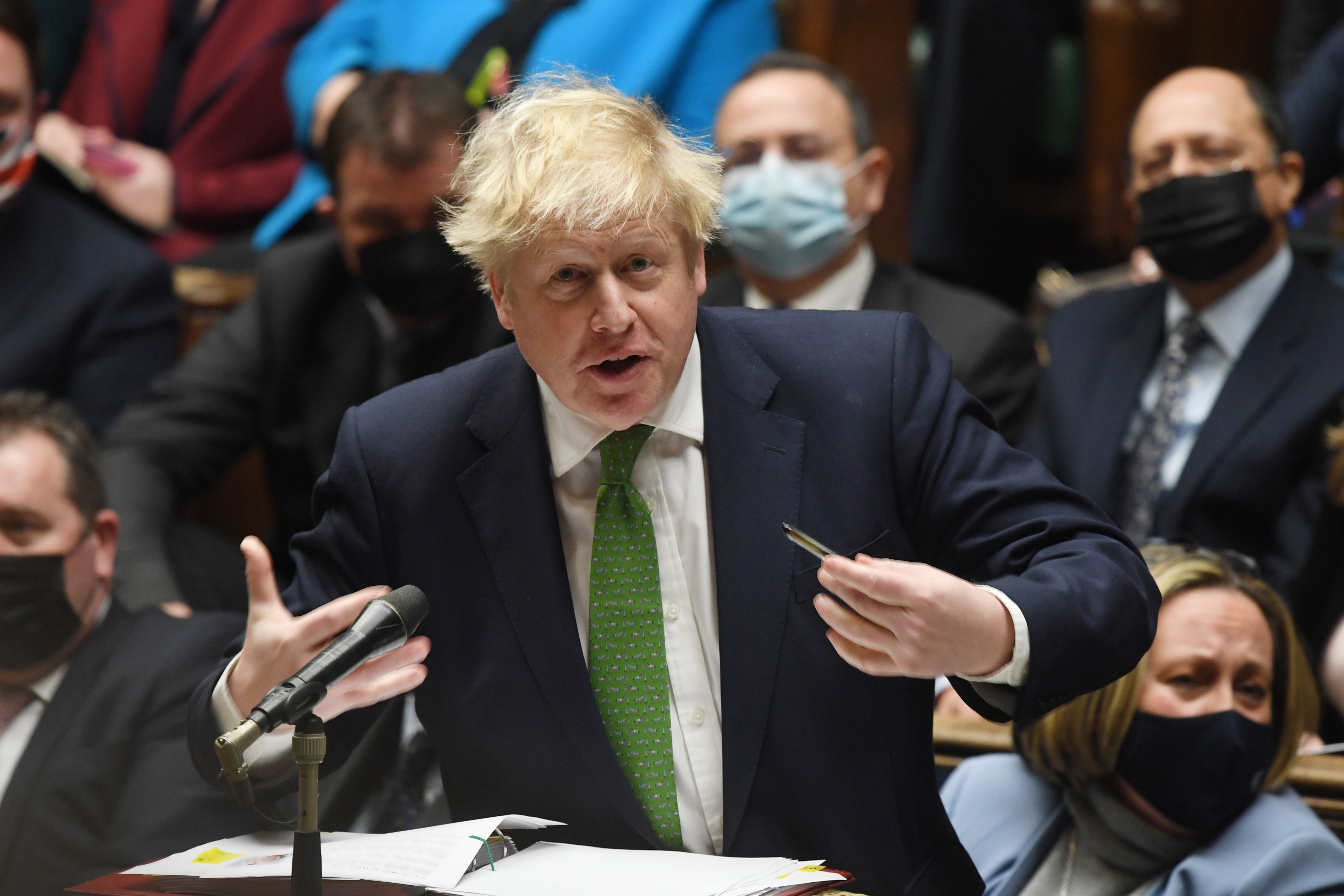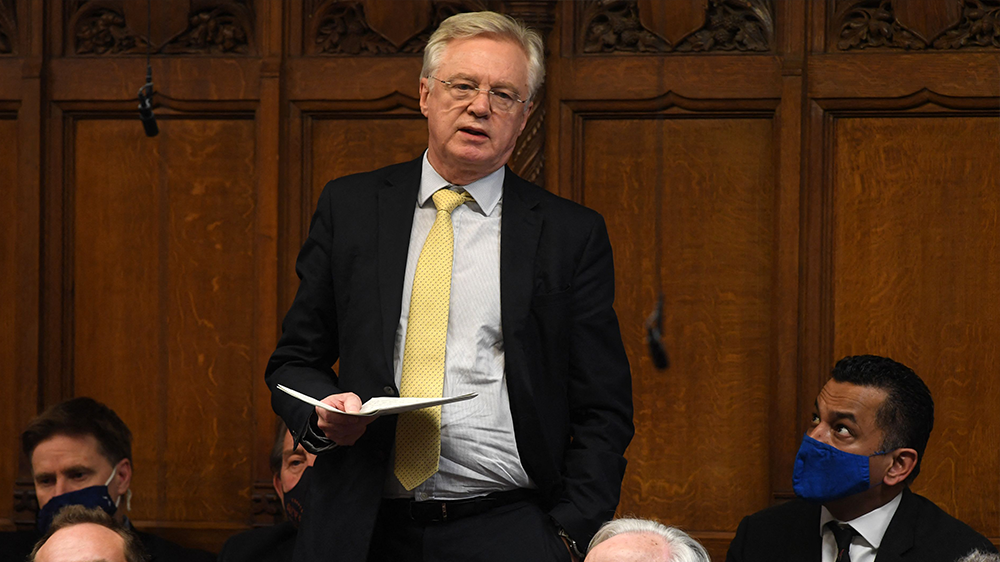Boris Johnson and his acolytes could condemn the Conservative Party to a decade out of power
When the party in government actively undermines the prime minister and vilifies its own leadership, why should ordinary electors vote for them, asks David Davis


Your support helps us to tell the story
From reproductive rights to climate change to Big Tech, The Independent is on the ground when the story is developing. Whether it's investigating the financials of Elon Musk's pro-Trump PAC or producing our latest documentary, 'The A Word', which shines a light on the American women fighting for reproductive rights, we know how important it is to parse out the facts from the messaging.
At such a critical moment in US history, we need reporters on the ground. Your donation allows us to keep sending journalists to speak to both sides of the story.
The Independent is trusted by Americans across the entire political spectrum. And unlike many other quality news outlets, we choose not to lock Americans out of our reporting and analysis with paywalls. We believe quality journalism should be available to everyone, paid for by those who can afford it.
Your support makes all the difference.After the turbulence of last year, the most common question put to me by young MPs is: “Will the next election be a repeat of 1997?” My answer used to be “no, the gap with Labour is wide but not deep. There is no enthusiasm for them and we can win it back.” That was until Boris’s acolytes started calling for his return. Now, I add: “At least it won’t be 1997, unless you make it so.”
The 1997 election was extraordinary in a number of ways. For example, the John Major government did a spectacularly good job of recovering the economy, so much so that Tony Blair’s economic adviser described it as the best economy ever inherited by any incoming Labour government.
Despite that, the Conservatives got absolutely no credit for it, suffered a devastating election result – and handed over to Labour a decade-long golden era of prosperity.
This was mostly because the Conservative Party in parliament spent the preceding four years fighting each other. When the party in government actively undermines the prime minister and vilifies its own leadership, why should ordinary electors vote for them? Today, we are at risk of doing the same thing.
The papers in the last few weeks have been full of Boris’s old disciples predicting armageddon at the polls in a way that makes you think that they are wishing for it to be true. This seems to be just so that their hero can make a triumphant return.
They forget that the blame for our standing in the polls falls evenly between him and Liz Truss. Each of them presided over a 10 per cent long-term decline in our standing. Neither was this decline the conventional mid-term drop that happens when governments make the hard decisions necessary to run the country.
Boris famously avoided any hard decisions like the plague. His share of the decline was a straight judgement on his character by the public, largely around Partygate.
Polling conducted around the time he left office gave him a net popularity rating of -53 per cent, one of the worst ratings for a prime minister in modern times. Liz Truss went one better, hitting -77 per cent, the worst for any British political leader since records began. No prime minister in living memory has come close to this territory and gone on to win an election.
Truss was largely supported by Boris’s team, and her dramatic fall was a judgement by both the markets and the public on the credibility (or lack thereof) of her economic policies; something about which she was warned many times by Rishi Sunak during the leadership election. The position we are in today is largely the responsibility of the Boris camp and its political heirs and successors.
Accordingly, the carping of the “king over the water brigade”, who like to present themselves as modern Thatcherites, can only be helpful to the Labour Party – and destructive for the Conservatives. Some of it depends on a spectacular misunderstanding of what it takes to run a country, and in many cases a misremembering of what our greatest modern prime minister, Margaret Thatcher, actually did. She was careful where they are careless, and realised that low-tax light touch Conservatism is a difficult art form, not a religion. If you want evidence of that, notice that the great architect of her tax strategy, Nigel Lawson, firmly supported Sunak – not Truss.
So there is only downside in this behaviour – and no upside.
The Boris brigade like to claim that their hero delivered the 2019 result single-handed. Now, any prime minister who wins an election can claim credit for it – that is how our system works – but that is not the same as saying either that he was the principal reason that we won or, by implication, that he could do it again.
I campaigned in the council estates of 17 constituencies that we won in 2019 and knocked on hundreds of doors in those seats. In not one was Boris Johnson the name that first sprung to people’s lips. That was Jeremy Corbyn. On the steps of working-class household after working-class household, I heard how they feared his tax rises and distrusted his principles. Corbyn was the primary reason we won that election.
The secondary reason was also not Boris. It was Nigel Farage who withdrew his candidates in every Tory-held seat and implicitly supported us across the board. That prevented a Liberal sweep in the south – which would have swept away Dominic Raab and jeopardised Jeremy Hunt, among many others – and encouraged many ex-Labour voters to support us in the Midlands and North.
Boris deserves some credit, of course, but nobody should imagine that he could repeat the trick. Neither Corbyn nor Farage will play a supportive role next time, and Boris himself is badly damaged.
Quite how damaged I realised exactly a year ago when I called for him to go. I had expected to make many enemies by that action, but I had come to the conclusion that both Partygate and a series of other unforced errors were seriously harming the party and undermining good government. In the days, weeks and months after my intervention, to my surprise, I was met with a huge amount of support. Dozens of people came up to me in the street, telling me that they were traditional Tory party voters and that they would never vote for us as long as Boris was our leader. That stream of people did not abate for some time.

There is now a vocal and determined minority of party members who want Boris back, but he remains a fiercely divisive figure. And it is going to get worse.
We are now heading into two inquiries. The House of Commons privileges committee will be deciding if Boris deliberately misled the House. Boris’ supporters desperately say, time and again, that it is impossible to prove it was intentional. They are forgetting that this is not subject to criminal standards of proof – “beyond reasonable doubt” – and I suspect that if the committee decides that on the balance of probabilities he misled us deliberately, they will find him guilty. There could follow all sorts of problematical outcomes, conceivably with him losing his seat.
But even if that is not the case, the next few months are going to be dominated by the spectacle of witness hearings, with us going over time and again how No 10 under Boris’s leadership ignored the rules that stopped people seeing their loved ones, often in the last days of life, and that paralysed everything from weddings to funerals.
Then we are going to see the public elements of the inquiry into the management of the pandemic. Boris likes to claim “he got all the big calls right”. The inquiry is likely to question that, particularly in light of the dreadful excess death numbers, and the comparative better performance of Sweden’s alternative strategy. To be fair, most other countries in the world made similar mistakes, and so did Labour, but it removes at least one claim to competence. That is before the PPE disasters, the failure of track and trace, the terrible mistakes on care homes and the like.
Boris is not going to be the electoral asset that his acolytes claim. The continual drumbeat calling for his return is certainly going to fail, but in the process it is corroding the party’s chances at the next election. Continually driving a message of division into the public domain, continually undermining the current leadership, will do nothing but harm.
What’s more, in 1997 many of those who were the most vocal critics of the then government were the ones who got the worst results, thrown out on their ear in the electoral response to their own antagonisms. It is entirely within the reach of a quietly competent Sunak government to win re-election. But if Boris’s foolish pipe dream of a resurrection continues, the same will happen again – and more importantly, we will be out of power for a decade once more.
David Davis served as shadow home secretary from 2003 to 2008 and secretary of state for exiting the European Union from 2016 to 2018. A member of the Conservative Party, he has served as the MP for Haltemprice and Howden, formerly Boothferry, since 1987
Join our commenting forum
Join thought-provoking conversations, follow other Independent readers and see their replies
Comments